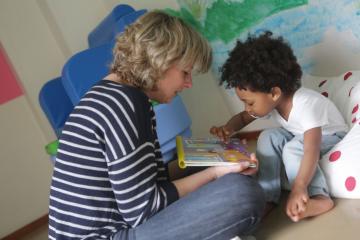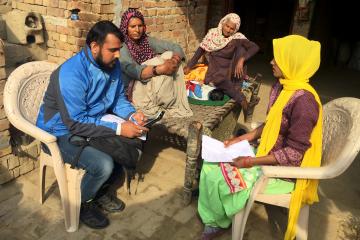
Catalyzing research partnerships: matchmaking from A to Z

At J-PAL, we help promote evidence-based policies by ensuring that decision-makers have access to scientific evidence on the questions that matter. But what spurs these research-policy connections in the first place? When setting up new research initiatives, we try to connect researchers to organizations that want to better understand the effectiveness of their programs or find innovative solutions to the social problems they seek to address, with the goal of generating evidence that will produce insights for a broad group of actors. This effort takes time: mapping out the landscape of actors, introducing many to the use of rigorous impact evaluations, collaborating to identify and refine research questions, and helping organizations consider how they might design and learn from an evaluation. The end goal is not just to launch new randomized evaluations, but to promote the use of evidence more broadly.
Lessons from Europe
In early 2019, J-PAL Europe launched the European Social Inclusion Initiative to identify new lessons about which programs are effective at promoting the inclusion of migrants in Europe. Across Europe, this is a policy issue that often provokes strong emotional and ideological responses but without much rigorous evidence, underscoring the need for cutting-edge research to inform more effective policies.
In preparation for this initiative, we wrote a 2018 literature review of key levers for social inclusion, which highlighted the lack of evidence on what migrant inclusion programs work best as well as some guiding questions. How can job training programs be better targeted to migrants’ needs (and to available jobs)? How can immigrants be best supported to acquire host-country language skills? What policies can prevent the formation of ethnic enclaves with limited access to services and jobs?
Based on the research gaps identified in the review paper, we began an intensive matchmaking process to identify organizations in Europe seeking to measure and improve the impact of their programs through rigorous impact evaluations. Over the course of a few months, we engaged with hundreds of organizations across Europe, explaining why, when and how the power of randomized evaluations can be harnessed to transform policymaking here in Europe. Reflecting on this process, we found some lessons that we think are relevant to others seeking to forge research-policy partnerships.
Lesson #1. Start with a broad topic and narrow down as you go
In a field with little rigorous evidence—both thematically and geographically—we discovered new policy-relevant research topics every day. We quickly learned that information travels fast and, despite language and territorial frontiers, networks of organizations working on similar issues exist. Once identified, we were able to snowball from one to the next. We asked organizations to recommend other implementers with whom we could connect for follow-up conversations, which help build momentum and expand our field of potential partners.
Lesson #2. Take time to build trust as you engage with new actors
For most governments and NGOs in Europe, RCT methodology is entirely new, and it takes time to build trust in the method and in J-PAL as an organization. Of course, we know adapting evidence-based policymaking does not happen overnight and often involves a culture shift, but for those enthusiastic about finding the best versions of their programs, taking the extra time to form a connection with staff and develop a deep engagement is worth the while.
Lesson #3. Bring people together
As part of the matchmaking process, we brought together more than 200 representatives of governments, NGOs, and foundations working across ten European countries, together with international organizations interested in rigorous evidence, for the ESII launch conference in 2019. This proved a useful opportunity for researchers and practitioners to connect in person for the first time, and it allowed organizations to connect the dots between them and many others working on similar issues in different contexts.
Marc Gurgand, @JPAL_Europe scientific director, offers a review of the limited existing evidence on migrant inclusion in Europe, including one study by @michelacarlana @elianalaferrara and Paolo Pinotti on the impact of career counseling + tutoring for immigrant students in Italy pic.twitter.com/1ZY1VB8Zsm
— Cillian Nolan (@ccjnolan) March 26, 2019
Lesson #4. Invest time in detailed project development
After the launch conference, we hosted a Project Incubator workshop to help organizations interested in forming a research partnership to better understand what conducting a randomized evaluation entails in practice. Through support from two donor partners, Community Jameel and Porticus, we were able to waive all workshop fees for every participant, opening up the training to a larger number of organizations. We were joined by representatives from 25 governments, international organizations, and NGOs across Europe. Over three days, participants worked through a range of concepts related to impact evaluation, from basic theory of change to the technical design of a randomized evaluation. Spending time with other organizations facing similar challenges and working with dedicated staff helped them identify concrete research questions and get more comfortable with the logistics of running a research project.
Last month professionals from organizations working to improve the inclusion of migrants and refugees in ten European countries joined us for a training on how to conduct randomized evaluations. The event was organized @PSEinfo with the support of @CommunityJameel and Porticus. pic.twitter.com/5SNx3MmKPT
— J-PAL Europe (@JPAL_Europe) June 28, 2019
We’ve learned through the incubator that trainings are more likely to generate new research projects when a sufficient number of training staff can be dedicated to each project. We were fortunate to count on the support of J-PAL affiliated researchers who, together with senior J-PAL staff, worked in detail with each participating organization to develop a tailored research design.
Not all organizations who participated in the incubator were ready to start a randomized evaluation. Some organizations needed more time to pilot their program before launching an evaluation, others were not yet operating at a scale that would make a randomized evaluation feasible, while others struggled to get their other implementing partners on board. But by preparing them for what an evaluation entails in practice, we’re seeking to lay the groundwork for future partnerships.
Encouraging cultural shifts
Many organizations working with migrants and refugees are active innovators with ideas they want to test and programs they want to improve. But courage and technical guidance usually aren’t enough to get an evaluation off the ground. To help establish a culture of evidence-use in policymaking in Europe, we have to create systems like the European Social Inclusion Initiative to make it easier for governments and NGOs to work together with researchers. In addition to building capacity and generating and sharing evidence, ensuring funds are available for these innovative organizations is essential.
Directions for future research
This extensive matchmaking process resulted in three partnerships to strengthen social inclusion and generate insights applicable across the continent. These partnerships will answer urgent policy questions: Can role models from diverse ethnic backgrounds reduce discrimination in the classroom? How can social interactions support inclusion? Can helping students from refugee and local communities understand one another’s perspectives promote a sense of community?
Each study will take a few years to complete. In the meantime, we are forging ahead with more projects: the second round of ESII Request for Proposals will be announced in the upcoming months. For updates on our work on social inclusion in Europe, visit the ESII page.


